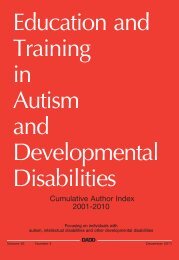Download the Journal (PDF) - Division on Autism and ...
Download the Journal (PDF) - Division on Autism and ...
Download the Journal (PDF) - Division on Autism and ...
You also want an ePaper? Increase the reach of your titles
YUMPU automatically turns print PDFs into web optimized ePapers that Google loves.
show that peer tutors can reliably implement<br />
c<strong>on</strong>stant time delay procedures with discrete<br />
tasks.<br />
The research studies described have supported<br />
<str<strong>on</strong>g>the</str<strong>on</strong>g> effectiveness of peer tutors as reliable<br />
implementers of systematic instructi<strong>on</strong>.<br />
While few studies used peer tutors to teach<br />
chained tasks <strong>and</strong> several studies used c<strong>on</strong>stant<br />
time delay, no study could be found that<br />
has examined <str<strong>on</strong>g>the</str<strong>on</strong>g> effectiveness of peer tutors<br />
implementing c<strong>on</strong>stant time delay to teach<br />
chained tasks. This investigati<strong>on</strong> was designed<br />
to answer <str<strong>on</strong>g>the</str<strong>on</strong>g> following research questi<strong>on</strong>s (1)<br />
Is a triadic instructi<strong>on</strong>al arrangement with instructor<br />
modeling <strong>and</strong> role-play effective in<br />
teaching high school-age peer tutors to implement<br />
<str<strong>on</strong>g>the</str<strong>on</strong>g> c<strong>on</strong>stant time delay procedure? (2)<br />
Will high school-age peer tutors without disabilities<br />
reliably implement <str<strong>on</strong>g>the</str<strong>on</strong>g> c<strong>on</strong>stant time<br />
delay procedure in teaching chained tasks<br />
across participants <strong>and</strong> over time? <strong>and</strong> (3) Will<br />
a peer tutor implemented c<strong>on</strong>stant time delay<br />
procedure be effective in teaching high<br />
school students with moderate <strong>and</strong> severe disabilities<br />
<str<strong>on</strong>g>the</str<strong>on</strong>g> acquisiti<strong>on</strong> <strong>and</strong> maintenance of<br />
chained cooking tasks?<br />
Method<br />
Participants<br />
Students. Four students (all male), ranging<br />
in age from 15 to 20 years, enrolled in a public<br />
high school participated. All attended at least<br />
<strong>on</strong>e general educati<strong>on</strong> class, lunch, <strong>and</strong> assemblies<br />
with students who did not have disabilities.<br />
Jake, a 16-year-old student who <strong>on</strong> <str<strong>on</strong>g>the</str<strong>on</strong>g> Wechsler<br />
Intelligence Scale for Children – WISC – III<br />
(Wechsler, 1991), obtained an IQ of 40, was<br />
diagnosed with moderate mental retardati<strong>on</strong>.<br />
Jake had a sight word vocabulary of 100-125<br />
words, could read <strong>and</strong> resp<strong>on</strong>d to many envir<strong>on</strong>mental<br />
signs, proper nouns, <strong>and</strong> words<br />
from computer pull-down menus, He was unable<br />
to read simple directi<strong>on</strong>s. Jake wrote <strong>and</strong><br />
verbalized his pers<strong>on</strong>al informati<strong>on</strong> (e.g.,<br />
name, guardian’s name, etc.). He prepared<br />
simple snacks (e.g., cold cereal, microwave<br />
popcorn). He attended general educati<strong>on</strong><br />
class for weightlifting <strong>and</strong> attended a social<br />
skills class <strong>and</strong> math class for students with<br />
mild mental disabilities. He went out of <str<strong>on</strong>g>the</str<strong>on</strong>g><br />
building twice a week for vocati<strong>on</strong>al training<br />
at a local grocery store. Jake’s Individualized<br />
Educati<strong>on</strong> Plan (IEP) included objectives for<br />
using tools <strong>and</strong> equipment in a safe manner,<br />
following pictorial directi<strong>on</strong>s, behavior selfmanagement,<br />
employability skills, <strong>and</strong> functi<strong>on</strong>al<br />
ma<str<strong>on</strong>g>the</str<strong>on</strong>g>matics.<br />
Louis, a 20-year-old student who obtained<br />
an IQ of 40 <strong>on</strong> <str<strong>on</strong>g>the</str<strong>on</strong>g> Wechsler Adult Intelligence<br />
Scale (Wechsler, 1997), was diagnosed with<br />
moderate mental retardati<strong>on</strong>. He was in his<br />
fifth year of enrollment at <str<strong>on</strong>g>the</str<strong>on</strong>g> high school <strong>and</strong><br />
attended general educati<strong>on</strong> classes in lifetime<br />
sports physical educati<strong>on</strong>, art, <strong>and</strong> food services<br />
technology. Louis had a sight word<br />
vocabulary of 150-200 words. He read <strong>and</strong><br />
resp<strong>on</strong>ded appropriately to many envir<strong>on</strong>mental<br />
signs, proper nouns, <strong>and</strong> comm<strong>on</strong>ly<br />
used words drawn from vocati<strong>on</strong>al experiences,<br />
<strong>and</strong> could prepare several simple foods<br />
from memory (such a cold cereal <strong>and</strong> microwave<br />
popcorn). He did need supervisi<strong>on</strong> to<br />
m<strong>on</strong>itor proporti<strong>on</strong>s used (e.g., overflowing<br />
<str<strong>on</strong>g>the</str<strong>on</strong>g> cereal bowl with milk, etc.). He received<br />
vocati<strong>on</strong>al training in <str<strong>on</strong>g>the</str<strong>on</strong>g> community at <str<strong>on</strong>g>the</str<strong>on</strong>g><br />
library <strong>and</strong> at a local community service<br />
agency 2-3 times a week. Louis was unable to<br />
comprehend written directi<strong>on</strong>s, <strong>and</strong> his IEP<br />
objectives were in <str<strong>on</strong>g>the</str<strong>on</strong>g> areas of food preparati<strong>on</strong>,<br />
employability skills, <strong>and</strong> purchasing,<br />
Charlie, a 15-year-old male with an IQ of 40<br />
<strong>on</strong> <str<strong>on</strong>g>the</str<strong>on</strong>g> WISC – III (Wechsler, 1991), was diagnosed<br />
with moderate mental retardati<strong>on</strong>,<br />
Down syndrome, <strong>and</strong> a severe speech deficit.<br />
He attended a general educati<strong>on</strong> class in physical<br />
educati<strong>on</strong>. Charlie went out of <str<strong>on</strong>g>the</str<strong>on</strong>g> building<br />
two times per week for community-based<br />
instructi<strong>on</strong> in safety <strong>and</strong> shopping instructi<strong>on</strong>.<br />
Charlie had a sight vocabulary of 25-30 words.<br />
He read <strong>and</strong> resp<strong>on</strong>ded appropriately to<br />
many envir<strong>on</strong>mental signs, product names,<br />
<strong>and</strong> names of family members, teachers, <strong>and</strong><br />
fellow students. His speech often was difficult<br />
to underst<strong>and</strong>, <strong>and</strong> during <str<strong>on</strong>g>the</str<strong>on</strong>g> time of <str<strong>on</strong>g>the</str<strong>on</strong>g><br />
study <str<strong>on</strong>g>the</str<strong>on</strong>g> teacher <strong>and</strong> speech pathologist were<br />
trying several voice-output devices to supplement<br />
speech. Charlie could follow verbal/<br />
model directi<strong>on</strong>s for making several simple<br />
snacks such as cold cereal <strong>and</strong> crackers with<br />
spreadables. Charlie was unable to read simple<br />
written directi<strong>on</strong>s, <strong>and</strong> his IEP included<br />
objectives in <str<strong>on</strong>g>the</str<strong>on</strong>g> areas of food preparati<strong>on</strong>,<br />
following pictured directi<strong>on</strong>s, <strong>and</strong> self-m<strong>on</strong>i-<br />
Peer-Implemented Time Delay / 113
















